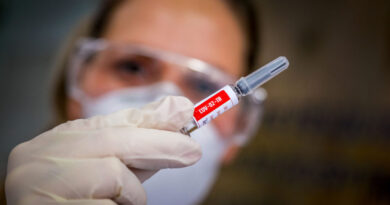Study: 397 Children diagnosed with heart inflammation after receiving Pfizer’s COVID-19 vaccine

A study published by the Centers for Disease Control and Prevention (CDC) on July 30 found that 397 children between the ages of 12 and 17 were diagnosed with heart inflammation called myocarditis after receiving the Pfizer-BioNTech coronavirus (COVID-19) vaccine.
The condition occurred mostly in young boys. Heart inflammation was not identified as an adverse reaction during the safety trials for the vaccine, but the CDC announced in June that the Food and Drug Administration (FDA) would add a warning to the Pfizer and Moderna coronavirus (COVID-19) vaccines about a possible link to cases of myocarditis in teenagers and young adults.
Myocarditis is a condition that involves inflammation of the heart muscle. Symptoms can include fever and fatigue, as well as shortness of breath and a very specific type of chest pain. Patients tend to say their chest hurts more when they lean forward.
The Advisory Committee on Immunization Practices (ACIP), CDC’s vaccine advisory group, met in June to discuss instances of myocarditis in people aged 30 and younger who have received an mRNA COVID-19 vaccine. (Related: Exclusive: Athlete who recovered from COVID facing ‘very different future’ after second dose of Pfizer vaccine triggers myocarditis.)
Pfizer and Moderna use mRNA technology in their COVID-19 vaccines, while Johnson & Johnson uses the more traditional virus-based technology.
The COVID-19 Vaccine Safety Technical (VaST) Work Group, which is part of ACIP, assessed the reported cases and noted that the risk of myocarditis following vaccination with the mRNA-based vaccines in adolescents and young adults is notably higher after the second dose, particularly in males.
According to VaST, the data suggests a likely association of myocarditis with mRNA vaccination in adolescents and young adults.
New study is based on reports of adverse reactions among children
The CDC conducted the new study by reviewing reports of adverse reactions to the Vaccine Adverse Event Reporting System (VAERS) between Dec. 14, 2020 and July 16, 2021.
VAERS received a total of 9,246 reports of adverse reactions among children during that period, 90.7 percent of which were made up of “non-serious adverse events.” The 397 reports of heart inflammation made up 4.3 percent of the total.
Fourteen children died after receiving the Pfizer vaccine, according to the study. The cause of death was not available for six of the cases. Of the eight other children, two died of intracranial hemorrhage, two died of pulmonary embolism, two committed suicide, one died of heart failure and one died of a blood condition. None of the reported deaths had been caused by heart inflammation.
“Impressions regarding cause of death did not indicate a pattern suggestive of a causal relationship with vaccination. However, cause of death for some decedents is pending receipt of additional information,” wrote Anne Hause, the CDC’s corresponding author.
Hause noted that the study is subject to several limitations, including the fact that “VAERS is a passive surveillance system and is subject to underreporting and reporting biases.”
Though the system is considered passive overall, doctors are required to report all serious events following vaccinations. The study also wasn’t designed to capture all cases of heart inflammation and only counted the reports which used the term “myocarditis.”
The FDA issued an emergency use authorization for the Pfizer vaccine for children 16 years and older on Dec. 11, 2020 and expanded the authorization to children 12 and over on May 10, 2021. (Related: More child guinea pigs needed: FDA asks for more children to take part in experimental trials of deadly coronavirus vaccines.)
CDC’s vaccine advisory group still wants children to take the risk
After reports of heart inflammation began to emerge in June, the ACIP concluded that the risks of high inflammation didn’t outweigh the benefits of Pfizer’s COVID-19 vaccine and decided to continue recommending it to children aged 12 and older.
The higher-than-expected rate of myocarditis cases among Americans below 30 is consistent with the data from Israel.
Israel’s Ministry of Health identified over 200 cases of myocarditis in men between 16 and 30 years old, a vast majority of those happening at the younger end of that range. That equates to a risk of between 1 in 3,000 and 1 in 6,000 of suffering from heart inflammation.
Pfizer previously said it had not observed a higher rate of heart inflammation than would normally be expected in the general population. Moderna also said that it could not identify a causal association with the heart inflammation cases and its vaccine.
Follow Immunization.news for more news and information related to coronavirus vaccines.
Sources include:


